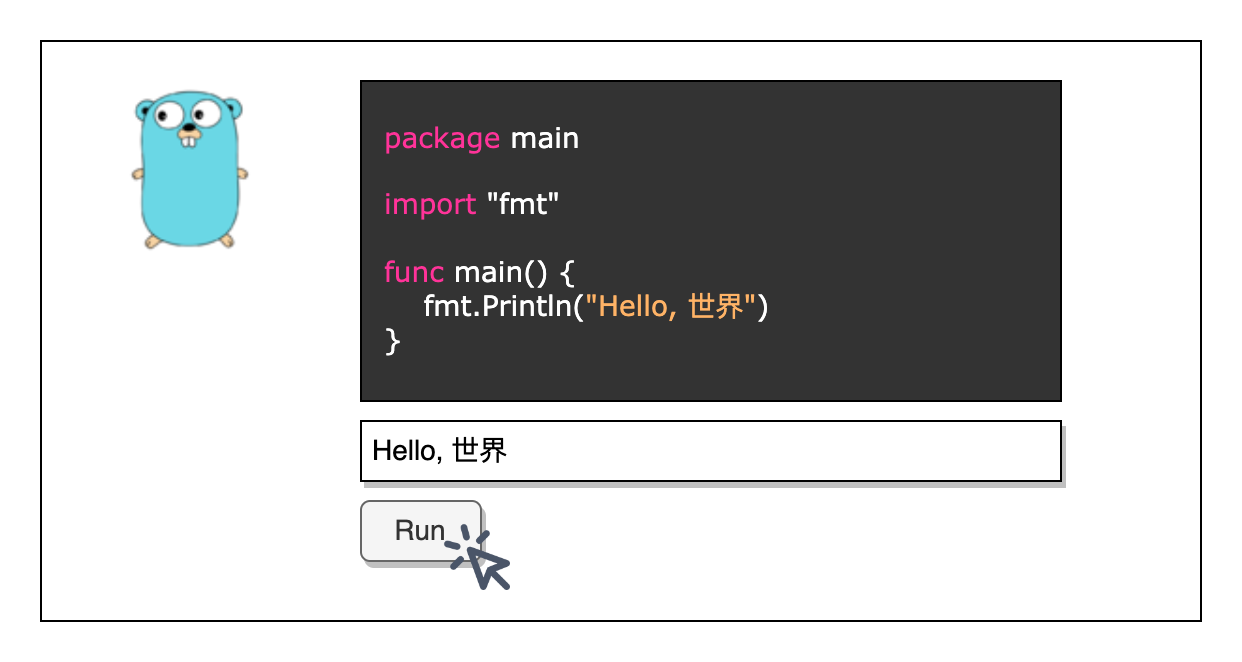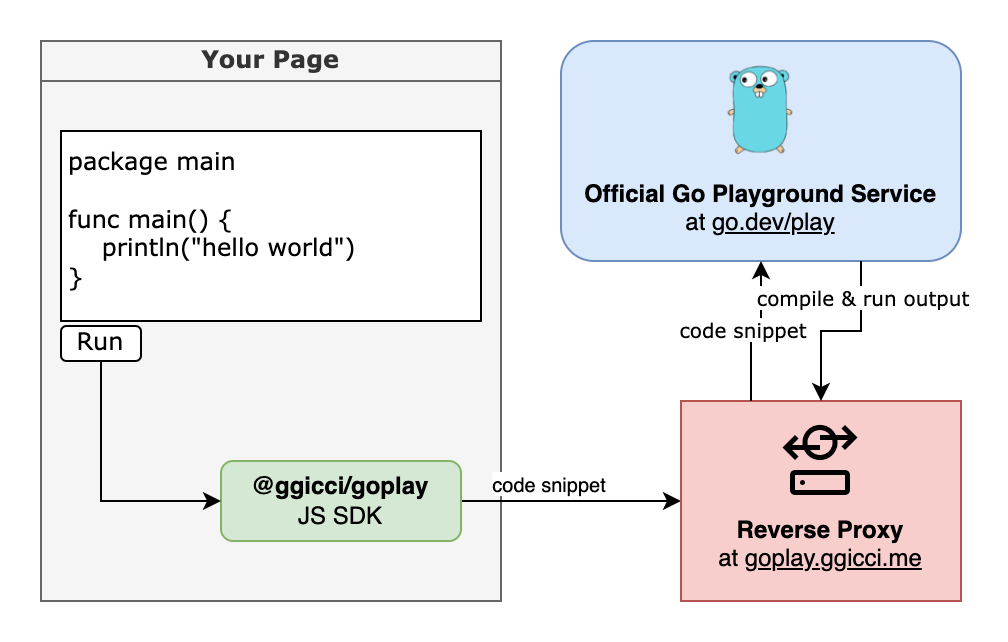goplay: Embed Go Playground on your Website

This post is introducing a way to run Go snippets on websites. Which leveraged the official Go Playground service at https://go.dev/play/.
Demo
Let’s take a quick look at the two demos below. You can click the Run button to see the output of the corresponding program. Click Share button to open the code in the official Go Playground to further edit/test the code on your hand.
Demo 1. Hello World
package main
func main() {
println("hello world")
}Demo 2. Import third-party package from GitHub
package main
import (
"fmt"
"net/http"
"net/http/httptest"
"github.com/ggicci/httpin" // 3rd-party packages: will be auto-downloaded
"github.com/justinas/alice"
)
type ListUsersInput struct {
Page int64 `in:"query=page;default=1"`
PerPage int64 `in:"query=per_page;default=20"`
Token string `in:"header=x-access-token;required"`
}
func ListUsers(rw http.ResponseWriter, r *http.Request) {
input := r.Context().Value(httpin.Input).(*ListUsersInput)
fmt.Printf("input: %#v\n", input)
rw.WriteHeader(204)
}
func main() {
r, _ := http.NewRequest("GET", "/?page=3", nil)
r.Header.Set("X-Access-Token", "secret...")
handler := alice.New(
httpin.NewInput(ListUsersInput{}),
).ThenFunc(ListUsers)
rw := httptest.NewRecorder()
handler.ServeHTTP(rw, r)
}How it works?

Since we were not able to make AJAX requests directly to go.dev because of CORS issue. I setted up a reverse proxy goplay.ggicci.me, which works as a downstream of go.dev. It is responsible to make requests on behalf of the clients to go.dev and return the response back to the clients.
I also implemented a simple JS SDK @ggicci/goplay to easily interact with the go playground service. Use it on your page to connect to your own reverse proxy and run go snippets.
Set up a reverse proxy to go.dev
with Caddy:
goplay.ggicci.me {
header {
# https://developer.mozilla.org/en-US/docs/Web/HTTP/Headers#cors
access-control-allow-origin "https://ggicci.me"
access-control-allow-headers "content-type"
access-control-allow-methods "OPTIONS,HEAD,GET,POST"
}
# only proxy the playground API of go.dev/play
route /_/* {
reverse_proxy https://go.dev {
header_up Host go.dev
}
}
respond 404
}Use @ggicci/goplay
The dead simple SDK just implemented a class GoPlayProxy with 3 primary APIs:
class GoPlayProxy {
// CTOR: specify a proxy url to connect
constructor(public proxyUrl: string = '/goplay') {}
// compile source code and get JSON response
public async compile(sourceCode: string, goVersion?: CompilerVersion): Promise<CompilerResponse>
// same as `compile`, but renders the JSON response as an `HTMLElement` into the specified container
public async renderCompile(container: HTMLElement, sourceCode: string, goVersion?: CompilerVersion): Promise<void>
// get the share URL of the source code
public async share(sourceCode: string, goVersion?: CompilerVersion): Promise<string>
}Visit https://github.com/ggicci/goplay for more details.
Hugo Shortcode goplay
If your are using hugo to generate your website. This section should be helpful to you.
By using the goplay shortcode, you can easily turn your Go code block into a Go playground. Take the following example, in your markdown file, just wrap the code block between {{% goplay %}} and {{% /goplay %}}.
## Sample Code
{{% goplay %}}
```go
package main
func main() {
println("hello world")
}
```
{{% /goplay %}}The latest code of goplay - hugo shortcode used by this site (former version) can be found here. Save it under your hugo directory correspondingly. Typically it is ${YourHugoSiteRoot}/layouts/shortcodes/goplay.html.
Use goplay in your Ghost Blog
My site is now using Ghost. Thanks to its Code Injection function (go to your blog settings and find it there), we can add our custom JavaScript code to drive goplay on our website.
The script I'm using on this website can be found here:
https://gist.github.com/ggicci/c85b4665e959a10fdbe0c97b33f44eb0
Who is using @ggicci/goplay?
- httpin Documentation
- add yours here by commenting below :)
